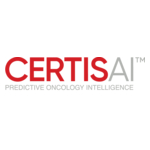Bioinformatics solution combines artificial intelligence, machine learning, and functional testing to elevate precision cancer treatment
SAN DIEGO–(BUSINESS WIRE)–#ArtificialIntelligence–Certis Oncology Solutions (“Certis”), a precision oncology and translational science company focused on combining functional assays and artificial intelligence to advance personalized medicine, today announced the launch of CertisAI™, a new predictive medicine platform that utilizes big data, statistical algorithms, and machine learning to predict drug efficacy based on gene expression biomarkers. This pan-cancer solution can accelerate drug discovery and companion diagnostics development.
Unlike common single-biomarker strategies often employed in precision medicine, CertisAI™ uses multivariate machine learning algorithms to capture the nuance of biomarker interactions and bring greater accuracy to predictions of drug efficacy.
“When it comes to understanding how to treat a person’s cancer, identifying oncogenic DNA mutations is just scratching the surface,” said Peter Ellman, Certis President and CEO. “This common approach to precision medicine isn’t capturing the nuance of gene expression levels or the complex interrelationships between multiple genetic features. These dynamics are what govern tumor response to any given therapy, but the complexity involved is too great for any human to grapple with. Computer models can,” he said.
Bringing AI Support to Cancer Therapeutics Development
Despite great progress in cancer research, fewer than 4% of oncology drugs that enter clinical trials are ultimately approved for use. Many factors contributing to this “translation gap” in cancer therapeutics could be mitigated by better-informed decision-making early in the development process. With CertisAI™, researchers can effectively replace many discovery screening studies with in silico predictions, and save time and money by bringing computer-aided insight to a variety of drug development challenges, such as:
- Identifying biomarkers that are predictive of therapeutic response
- Uncovering biological pathway mechanisms of action
- Ranking cancer types most likely to respond to a lead candidate
- Elucidating synergistic potential of combinatory therapies
- Selecting optimal cancer models for in vitro and in vivo validation studies
- Developing stratification strategies for clinical trial patient selection
- Prioritizing candidates in compound libraries and/or assessing the value of intellectual property
The origins of CertisAI™ are rooted in the company’s mission: finding the optimal therapy for every cancer patient, the first time, every time. Since its founding in 2016, Certis has been validating a functional approach to personalized medicine using orthotopic patient-derived xenografts—sophisticated mouse models of individual cancers that enable the simultaneous testing of multiple therapeutic options. Data from these studies may be used to help inform oncologists’ treatment strategies.
Relieving the Validation Bottleneck
In addition to developing the predictive platform, Certis is tackling a persistent problem in the AI-driven healthcare landscape—how to efficiently validate in silico predictions. Conducting clinical trials and waiting for long-term outcomes is inherently slow, making validation a bottleneck to progress.
Certis draws on deep experience developing orthotopic patient-derived xenograft (O-PDX) models, performing mouse clinical trials to validate CertisAI™ predictions. Results from these studies generate training data to inform the platform’s machine learning algorithms, improving predictive accuracy.
Most genomic testing companies that include possible matched treatments in their reports consider only drugs already approved for companion biomarkers. The Certis predictive algorithms look outside standard-of-care, including off-label uses of approved drugs as well as investigational drugs in clinical trials. The company reports that internal cross-validation results show CertisAI™ predictions are highly accurate in mono and combination therapies (>90% and 83% combined, respectively), and external validation on O-PDX models has shown promising results.
For more information, visit www.certisoncology.com.
About Certis Oncology Solutions
Certis Oncology Solutions is a life science technology company committed to realizing the promise of precision oncology. Our product is Oncology Intelligence™ — highly predictive therapeutic response data derived from advanced biological models of cancer and enhanced with AI-driven bioinformatics. Our proprietary platform can help inform personalized cancer care and accelerates the development of new cancer therapies.
Contacts
Certis Oncology Solutions
Kristein King
kking@certisoncology.com
573-818-4528



















